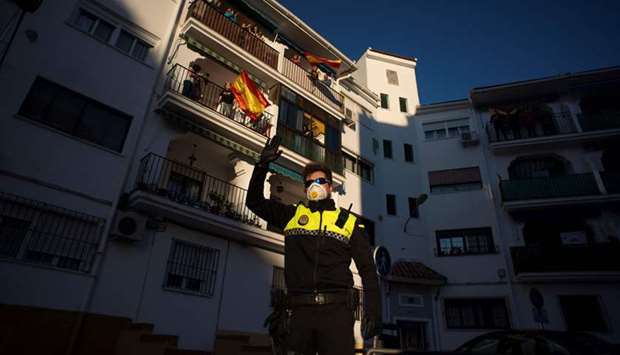Italians should brace for a long fight against the novel coronavirus epidemic, a top official warned yesterday, as the daily Covid-19 death toll fell under 700 for the first time in nine days.
The coronavirus causes the Covid-19 respiratory disease.
“Refrain from thinking that it is already time to change, or if you will, to normalise your behaviour,” government health sector commissioner Domenico Arcuri said in a press conference.
“Our battle against the coronavirus continues non-stop but we should avoid starting to think that we are winning, that we have cornered our opponent and that we are about to prevail,” he added.
Hours later, the Civil Protection Agency reported 681 new Covid-19 deaths, bringing Italy’s death toll, already the world’s highest, to 15,362.
The daily death count had peaked at 969 on March 27.
One of the dead yesterday was 51-year-old police officer Giorgio Guastamacchia, a member of Prime Minister Giuseppe Conte’s security detail.
“For all of us who had known him, for his security detail colleagues, for the staff of the Prime Minister’s office, it is a time of great sorrow,” Conte wrote on Facebook.
When news broke on March 21 of Guastamacchia’s illness, government sources said that Conte had not been in close contact with the officer and had tested negative to the virus.
The total number of infections, rose to 124,632, up 4% from Friday, but for the first time there was a fall in the number of people under intensive care, down by 74 to 3,994.
“This is very important news because it allows our hospitals to breathe,” Civil Protection Agency chief Angelo Borrelli said presenting the figures.
Italy’s epidemic has slowed down, but not stopped.
In Lombardy, the northern region at the epicentre of the crisis,
President Attilio Fontana ordered people to cover their nose and mouth with masks, scarves or any other tissue whenever they go out.
Meanwhile, the justice ministry said that face masks, which have been in short supply across the country, would start being produced in three prisons from mid-April.
In early March there were violent riots in several jails, sparked by inmates’ fears about contagion risks, which led to 12 deaths among prisoners and dozens of escapes.
On March 31, the justice ministry said 19 out of more than 58,000 prisoners and 116 out of nearly 38,000 guards had tested positive to the novel coronavirus.
Italy has been under a national lockdown since March 10, but there are signs of lockdown fatigue, especially in southern regions which have been less affected by the outbreak.
Yesterday’s newspapers were dominated by headlines and pictures of people flouting home-confinement rules and pledges by authorities to increase police checks.
The flattening of the curve “should not at all be interpreted as a message that we have already overcome the critical phase and we are clear of the danger”, Professor Franco Locatelli said.
Locatelli, one of the public health experts advising the government and head of the Supreme Health Council, added: “We are not clear of anything.”
Meanwhile, Spain’s prime minister announced yesterday an extension of the country’s lockdown to combat the coronavirus, saying the measures are “bearing fruit” as the number of deaths fell for a second day in a row.
A nationwide 15-day state of emergency was first announced on March 14 barring people from leaving home except for essential outings such as buying food or seeking medical care.
It was to end on April 11 after being extended by two weeks.
“The cabinet on Tuesday will again ask for authorisation from parliament to extend for a second time the state of alert until Saturday, April 25, at midnight,” Prime Minister Pedro Sanchez said in a televised speech.
The extra weeks are “the time that our health system needs to recover”, he said.
Hospitals, in particular the intensive care units, have been overwhelmed by an influx of coronavirus patients.
However, yesterday Spain recorded a second successive daily fall in coronavirus-related deaths with 809 fatalities.
The total number of deaths in the country stands at 11,744, second only to Italy.
The number of new Spanish cases also slowed to 7,026, taking the total to 124,736.
“We know that these three weeks of isolation are bearing fruit,” Sanchez said.
The confinement has allowed “a containment of the avalanche on the hospitals, the care of the sick and saved lives”.
But to “ease up now would have a worse result”, he said, warning of a “second wave” of infections.
“Yes, we are seeing a glimmer of hope” but “we are entering a new phase that will not be easy, the transition phase”, said Dr Maria Jose Sierra of the health ministry’s emergencies centre.
Sanchez said he could not rule out further extensions, but said an easing of the strict regulations could be possible if the situation improves.
Spain is still racing against the clock to procure more medical equipment for its overstretched hospitals, notably respirators.
About 50 arrived from Germany on Friday, after Spain appealed to its North Atlantic Treaty Organisation (Nato) allies.
Another shipment was to be sent from Turkey but was eventually requisitioned by Turkish authorities.

A police officer waves as people applaud to thank healthcare workers dealing with the coronavirus, in Ronda, Spain.
